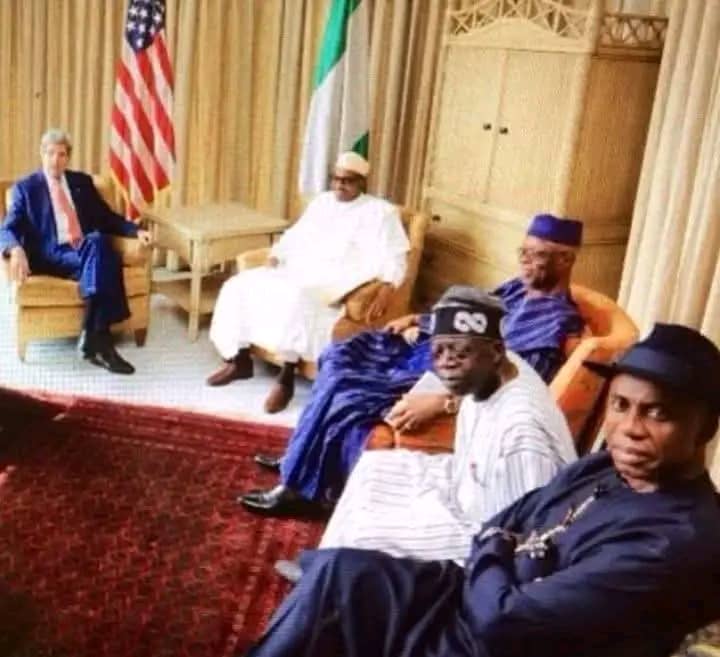
When history begins to echo, even the loudest propaganda can’t drown the truth. Ten years after the Chibok tragedy shaped an election, global scrutiny has returned, and this time, it’s pointing at those who weaponized outrage.
We can still remember the conspiracy that unfolded during the Chibok Girls tragedy under President Goodluck Jonathan. For those with short memories, let’s recall: a national trauma became a global stage play, choreographed to shift power.
I sincerely don’t care what drives Donald Trump’s renewed interest in Nigeria or his declaration of our country as a “nation of concern” over the persecution of Christians. Motives may differ, but what matters now is simple, the truth has finally caught up with those who once thrived on deceit.
Before the 2015 election, the late Muhammadu Buhari, Bola Ahmed Tinubu, Rotimi Amaechi and others, made that fateful trip to Washington to meet then–U.S. Secretary of State John Kerry. That meeting was no ordinary courtesy call; it was a strategic alignment that reshaped Nigeria’s destiny. Not long after, the Bring Back Our Girls campaign erupted into a global media sensation. The world wept for Chibok, and rightfully so, but behind the tears, political actors were busy weaponizing the tragedy.
Western governments and global media amplified the outrage, while the opposition in Nigeria rode the wave like seasoned surfers. Jonathan’s government was painted as clueless, corrupt, and cold-hearted. The rest, as they say, is history.
The 2015 election swept the All Progressives Congress (APC) into power as the “savior party” the supposed antidote to insecurity and the promised rebirth of national dignity. But a decade later, what do we have? An epidemic of killings, kidnappings, and religious persecution worse than the nightmare they once blamed on Jonathan. The same class that politicized tragedy has governed without conscience or competence.
Let’s not deceive ourselves. The Chibok episode wasn’t just a terrorist act, it was a global script with geopolitical fingerprints. The world’s outrage became the opposition’s campaign capital. And when the APC took over, the so-called strongman Buhari inherited the same demons of insecurity, only to watch them multiply into new monsters: ISWAP, mass banditry, and unchecked religious violence that has consumed thousands of innocent lives.
Now, under Tinubu, history has come full circle. When Donald Trump declared Nigeria a country of particular concern over the persecution and mass killing of Christians, it wasn’t a random outburst, it was a geopolitical signal. It marked the return of global scrutiny, the same kind that once fueled APC’s rise to power.
Trump’s declaration, echoed by other Western voices, suggests that the world no longer sees Nigeria as a stable democracy but as a country sliding toward religious cleansing and state failure. In Washington’s language, this is not just about sympathy, it’s a warning shot. Once the U.S. lists a nation for systematic religious persecution, sanctions, travel bans, and aid restrictions usually follow. But beyond that, such designations often pave the way for subtle diplomatic engineering, support for political change when a regime is deemed incapable of protecting its own citizens.
Washington may quietly shift its alliances. The same global powers that smiled on Buhari in 2015 could now begin to back opposition figures or reformist movements capable of restoring stability and religious freedom. The U.S. doesn’t always announce regime-change plans; it begins with moral positioning, humanitarian justification, and selective partnership. Nigeria under Tinubu has approached this stage.
In 2014, APC and its foreign allies applauded Western pressure when it helped discredit Jonathan. Today, that same pressure has returned, but it no longer serves their interests. The law of seedtime and harvest is alive, what was sown as propaganda in 2014 has ripened into bitter fruit in 2025. Tinubu now stands where Jonathan once stood, under the unforgiving spotlight of international judgment, accused of negligence, complicity, and moral weakness in the face of bloodshed.
The irony is chilling. The APC built its political empire on the ruins of a tragedy, and now finds itself drowning in the very storm it once stirred. Nigeria’s insecurity has evolved beyond politics; it is now a moral and humanitarian crisis. The blood of innocent Nigerians, Christians and Muslims alike, cries louder than the loudspeakers of campaign rallies.
For too long, we have lived under governments that exploit grief but never heal it. The U.S. designation is more than a diplomatic tag; it is a mirror reflecting our national decay. If Tinubu does not act swiftly to impress the US, not with press releases but with decisive reforms, justice, and protection for vulnerable communities, he risks becoming yet another leader consumed by the chaos that brought him to power.
Because in the end, Nigeria does not need clever politicians who know how to spin tragedy.
It needs a leader who can stop the bleeding before the world decides to intervene in ways we may not control.
It’s all over for Tinubu and his APC!
Meche Oswald
Soldier of the Labour Dream.
Comrade In the Fight.




